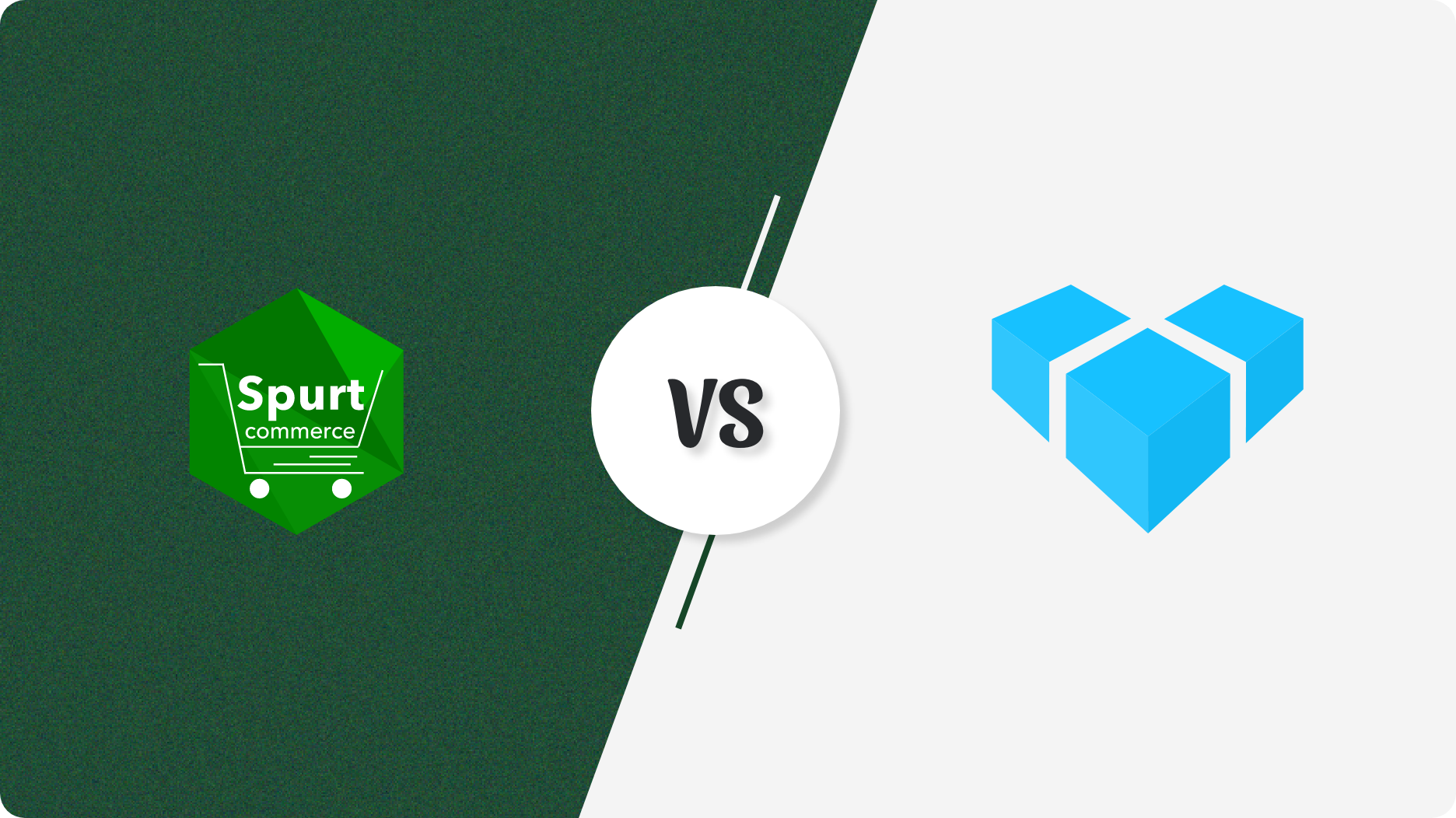COMPARISON
Spurtcommerce vs Vendure

Practical Comparison for Modern E-commerce Development
Overview
This comparison evaluates Spurtcommerce and Vendure, both modern Node.js-based headless commerce platforms. While both support extensibility, API-driven development, and multi-vendor models, they differ significantly in terms of architecture, frontend readiness, mobile support, and purchase models.
Spurtcommerce emphasizes faster deployment with fully functional D2C and B2C marketplace features out-of-the-box, including web and mobile frontends. Vendure offers a highly flexible, plugin-driven backend powered by TypeScript and GraphQL, suitable for custom commerce builds.
About Spurtcommerce
Spurtcommerce is a Node.js and Express.js-based headless commerce solution designed for businesses seeking to launch either D2C storefronts or multi-vendor marketplaces quickly.It comes with ready-made Angular and React (Next.js) storefronts, an admin panel, a seller/vendor panel, and a Flutter mobile app.
The enterprise license provides complete source code access, including backend, frontend, and microservices. This enables businesses to fully own, customize, and scale their platforms without dependencies on the vendor. Spurtcommerce prioritizes developer simplicity with REST APIs and conventional JavaScript technologies.
About Vendure
Vendure is an open-source, headless commerce platform built with Node.js, Next.js, and TypeScript, centered around a GraphQL-first architecture. It offers a highly modular and extensible backend powered by a sophisticated plugin system, allowing developers to customize business logic, workflows, and data models.
Vendure supports multi-vendor commerce via its official marketplace plugin, which handles order splitting, seller management, and commission logic. While Vendure provides a powerful admin UI (built in Angular), it does not offer an official storefront or mobile app—those are expected to be developed or adapted by the client. Vendure’s source code is fully open under GPLv3, with an optional commercial license for enterprises needing proprietary use rights, SLA-backed support and enterprise features.
| FEATURE | SPURTCOMMERCE | Vendure |
|---|---|---|
| Tech Stack | Node.js + Express.js, Angular/React (Next.js), Flutter mobile app | Node.js + Next.js + TypeScript,GraphQL-first APIs, Angular Admin UI |
| Architecture | Headless, REST API-based, supports both monolithic and microservices deployment | Headless, GraphQL-first, modular with plugin-based extensibility |
| Frontend Options | Ready-made storefronts in Angular & React | Community starter templates available |
| Mobile App | Flutter mobile app included with enterprise license | Requires custom development |
| Marketplace Support | Native multi-vendor with seller panel, commission logic, and onboarding built-in | Supported via official Marketplace Plugin (channels, seller API, order splitting) |
| Admin & Seller Dashboards | Admin dashboard + Seller dashboard included (Angular) | Admin UI (Angular) provided; Seller dashboard requires plugin. |
| Functional Features | Catalog, orders, CRM, SEO, promotions, chat, CMS, analytics, multi-language etc. | Catalog, orders, checkout, promotions, multi-channel, multi-currency, order splitting (via plugin) |
| Source Code Access | Full source code for backend, frontend, and microservices with enterprise purchase | Full source under GPLv3; also available under commercial license for proprietary use |
| Customization Approach | AddOns-based; JS-friendly; extend core features without modifying core code | Plugin system, GraphQL schema extensions, event-driven workflows |
| Time to Launch (Marketplace) | Fast - complete marketplace setup with storefronts, admin, seller dashboard, and mobile apps included | Moderate - requires frontend and marketplace plugin setup |
| Learning Curve | Low - Express.js, REST API, Angular/React, Flutter (familiar to JS developers) | Moderate - Requires expertise in Next.JS, GraphQL, TypeScript, and plugin architecture |
Spurtcommerce is ideal for:
- Teams that want to launch quickly with a complete multi-vendor marketplace or B2C storefront
- Businesses wanting a ready-made D2C or B2C marketplace, including seller onboarding, commission models, and dashboards.
- Teams looking for faster deployment with minimum coding for frontend, admin,seller panels, and mobile apps.
- Companies that require full source code ownership, including backend, frontend,and microservices, for complete white-labelling and independence.
- Development teams preferring REST APIs and the JavaScript ecosystem, with lower learning complexity.
Vendure is ideal for:
- Developers building highly custom, backend-first commerce platforms z
- Teams highly skilled in Next.js, GraphQL, and TypeScript, who want to build highly tailored commerce platforms.
- Businesses that prioritize a plugin-first, backend-extensible system, needing fine-grained control over backend workflows.
- Enterprises comfortable building or adapting their own storefronts and mobile apps from scratch or community templates.
- Projects requiring a GraphQL-first headless approach with microservices and API-centric deployments.
Conclusion
Both Spurtcommerce and Vendure are highly capable, modern headless commerce platforms.
Spurtcommerce stands out for companies seeking an immediate launch-ready D2C or multi-vendor marketplace, with all critical components — storefront, seller dashboard, admin panel, and mobile app — included and fully customizable with source code.
Vendure shines for developer-heavy teams needing a highly modular, GraphQL-driven backend, where deep backend customization, fine-grained APIs, and plugin-based extensibility are the priority — but requires significant frontend and marketplace-specific development effort.



 En
En Es
Es Ar
Ar